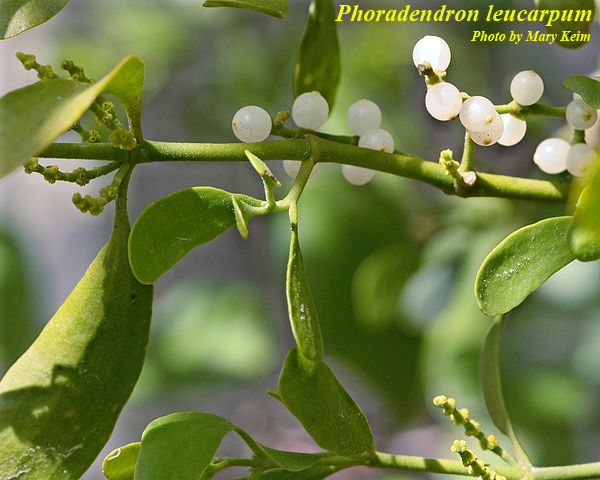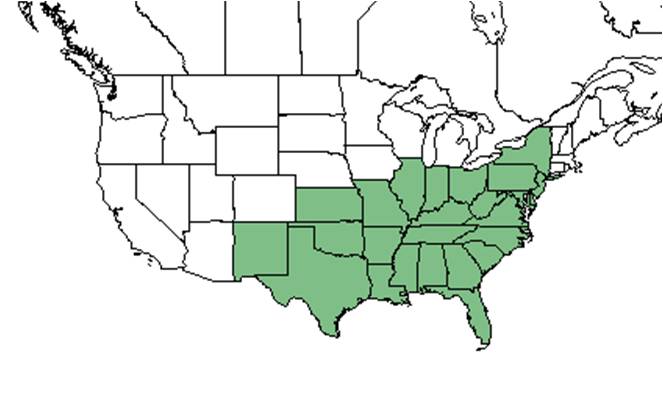Difference between revisions of "Phoradendron leucarpum"
KatieMccoy (talk | contribs) (→Taxonomic notes) |
KatieMccoy (talk | contribs) (→Description) |
||
| Line 24: | Line 24: | ||
==Description== | ==Description== | ||
<!-- Basic life history facts such as annual/perrenial, monoecious/dioecious, root morphology, seed type, etc. --> | <!-- Basic life history facts such as annual/perrenial, monoecious/dioecious, root morphology, seed type, etc. --> | ||
| + | ''P. leucarpum'' is a clumpy, evergreen shrub that can be found growing on branches of broad-leaved trees. The leaves are opposite, thick and leathery, oval to round. Flowers are small and inconspicuous and the fruits are white<ref name="floridata"/>. | ||
| + | |||
| + | It is a hemiparasitic species that has chlorophyll and produces it's own food, but also has modified roots that extracts water and minerals from the host tree's circulatory system<ref name="floridata"/>. It infects more than 105 tree species: broadleaf, evergreen, deciduous, and confiers<ref name="warnell">[[https://www.warnell.uga.edu/outreach/pubs/pdf/forestry/mistletoe%20monograph%20pub%2008-25.pdf]]Warnell School of Forestry and Natural Resources. Accessed: February 20, 2016</ref>. | ||
==Distribution== | ==Distribution== | ||
Revision as of 20:21, 18 February 2016
| Phoradendron leucarpum | |
|---|---|

| |
| Photo by Mary Keim, Atlas of Florida Vascular Plants | |
| Scientific classification | |
| Kingdom: | Plantae |
| Division: | Magnoliophyta - Flowering plants |
| Class: | Magnoliopsida – Dicotyledons |
| Order: | Santalales |
| Family: | Viscaceae |
| Genus: | Phoradendron |
| Species: | P. leucarpum |
| Binomial name | |
| Phoradendron leucarpum (Raf.) Reveal & M.C. Johnst. | |

| |
| Natural range of Phoradendron leucarpum from USDA NRCS Plants Database. | |
Common name: oak mistletoe
Contents
Taxonomic notes
The name "mistletoe" comes from the ancient Anglo-Saxon word for dung and twig, which is derived from the observation that mistletoe often sprouts out of bird dropping on branches[1].
Description
P. leucarpum is a clumpy, evergreen shrub that can be found growing on branches of broad-leaved trees. The leaves are opposite, thick and leathery, oval to round. Flowers are small and inconspicuous and the fruits are white[1].
It is a hemiparasitic species that has chlorophyll and produces it's own food, but also has modified roots that extracts water and minerals from the host tree's circulatory system[1]. It infects more than 105 tree species: broadleaf, evergreen, deciduous, and confiers[2].
Distribution
Ecology
Habitat
Phoradendron leucarpum can be found in mixed hardwoods, cypress swamps, tupelo swamps, floodplain forests, and pine/oak scrubs (FSU Herbarium). It is a parasitic plant that has been observed growing on Fraxinus, Liquidambar, Quercus nigra, Carya glabra, Prunus umbellata, Prunus angustifolia, Celtis laevigata, Quercus myrtifolia, Prunus serotina, Planera aquatica, Carya aquatica, Quercus virginiana, Acer, Morus, Populus, Ulmus and Magnolia (FSU Herbarium).
Phenology
It has been observed fruiting January, March, November and December; and flowering January, October, and December (FSU Herbarium).
Seed dispersal
Seed bank and germination
Fire ecology
It has been observed in recently burned pine forests (FSU Herbarium).
Pollination
The following Hymenoptera families and species were observed visiting flowers of Phoradendron leucarpum at Archbold Biological Station (Deyrup 2015):
Vespidae: Mischocyttarus cubensis
Use by animals
Diseases and parasites
Conservation and Management
Cultivation and restoration
Photo Gallery
References and notes
Deyrup, M.A. and N.D. 2015. Database of observations of Hymenoptera visitations to flowers of plants on Archbold Biological Station, Florida, USA.
Florida State University Robert K. Godfrey Herbarium database. URL: http://herbarium.bio.fsu.edu. Last accessed: October 2015. Collectors: Loran C. Anderson, J. Beckner, Kathy Craddock Burks, J. Carmichael, Nancy Edmonson, Mildred E. Feagle, Angus Gholson Jr., William T. Gillis, Robert K. Godfrey, D.W. Hall, B.K. Holst, Roy N. Jervis, Beverly Judd, Walter S. Judd, Robert L. Lazor, N. Lee, Karen MacClendon, K.M. Meyer, Chas. A. Mosier, C. Morgan, John B. Nelson, Jose Luis Serna, G.K. Small, John K. Small, A. Townesmith, Chris Wall, Randy Wall, D.B. Ward. States and Counties: Florida: Alachua, Calhoun, Collier, Franklin, Gadsden, Hernando, Highlands, Jackson, Jefferson, Leon, Liberty, Marion, Polk, Sarasota, Taylor, Wakulla.
Georgia: Decatur, Thomas. Country: Mexico. Compiled by Tall Timbers Research Station and Land Conservancy.